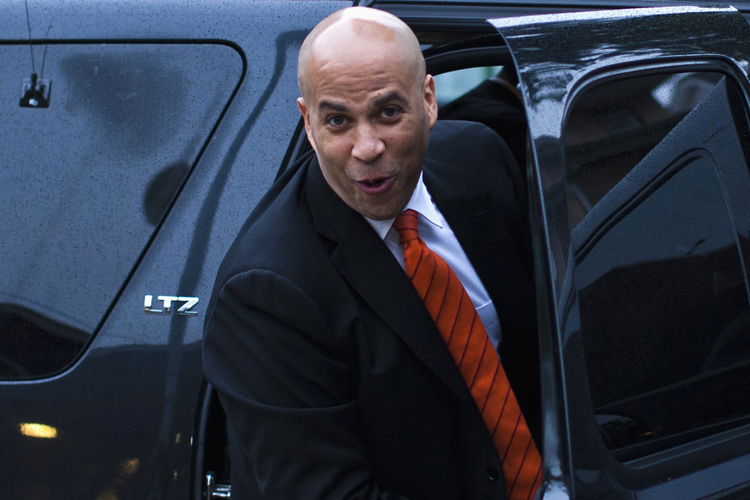On Oct. 16, Newark Mayor and potential presidential aspirant Cory Booker is strongly favored to be elected New Jersey’s next senator. The next day, advocates expect Newark’s city council will send Booker a bill mandating employers offer earned sick leave – the latest in a wave of local paid leave bills boosted by labor and fervently opposed by big business. That means that signing, vetoing or negotiating to narrow a bill mandating paid sick leave – an issue the mayor says he supports in principle — could be one of Booker’s last high-profile moves as mayor. With activists hoping a city bill will fuel momentum for a statewide law, it’s a decision that New Jersey governor and fellow political celebrity Chris Christie could face as well.
In an afternoon email to Salon, Booker’s director of communications, James Allen, expressed support for the concept but stopped short of committing to back the council members’ bill. Noting that no formal proposal had yet been introduced, Allen said, “Mayor Booker supports paid sick leave and will carefully review any legislation to ensure the city passes something that protects both workers and the small businesses that employ so many Newarkers.”
New Jersey Working Families Alliance policy and communications coordinator Rob Duffey told Salon earlier this afternoon that advocates have had “talks with Mayor Booker’s office” on the topic, but “he’s yet to weigh in.” Duffey called backing paid sick leave “a great way to establish his progressive bona fides and prove he can not only talk the talk but walk the walk when it comes to addressing poverty.” Duffey’s group is closely tied to the national Working Families Party, whose affiliates have been at the forefront of paid sick leave efforts across the country. Booker has drawn fire from the left for moves ranging from his advocacy for school vouchers to his defense of Bain Capital.
Newark council member Ras Baraka told Salon that while he couldn’t read the mayor’s mind, “I don’t see why the mayor would be opposed to making sure that workers receive the opportunity to go home and take care of themselves while they’re sick,” said. He told Salon he expected Booker “would use it as an opportunity to further his position on the issue” of workplace standards.
Baraka was among six of Newark’s eight council members who last week released a statement announcing support for a sick leave bill, writing that “Guaranteeing earned sick days for New Jersey workers will strengthen families, protect the public health, and safeguard the healthy and productive workforce that is the backbone of our city’s economy.” The council members said they’d try to introduce a bill “within the month.” The bill will likely be first introduced on Oct. 2 and receive a final vote Oct. 17, according to Duffey.
While many progressives have been on defense in many recent state and local policy fights, the paid sick leave push has seen comparatively rapid progress. As I’ve reported, the first such law passed in San Francisco in 2007, followed by bills passed in Washington, D.C., in 2008; in Seattle and statewide in Connecticut in 2011; and in Portland and New York City this spring. An effort to pass paid leave by referendum failed in Denver. In Philadelphia, Democratic Mayor Michael Nutter allowed a narrower bill tied to city contracts and subsidies to pass, but twice vetoed broader legislation. In Milwaukee, advocates got a bill passed but it was overridden by a statewide law signed by Gov. Scott Walker banning such mandates; other Republicans have since followed Walker’s lead in seeking to preemptively outlaw cities from forcing businesses to offer paid sick days.
Paid leave supporters argue that the mayoral primary defeat of New York City Speaker Christine Quinn, who prevented a vote on a paid leave bill for three years before agreeing to a narrowed compromise, offers a cautionary tale for elected officials who consider standing in their way on the issue. Quinn had told the New York Daily News in 2010 that while she supported “the goal of expanding benefits to workers,” she had to “help small business stay alive in a fragile economy.”
“I think the lessons of New York are really being taken,” Duffey told Salon. Citing polling, Duffey called paid sick leave “just a really common sense policy that is immensely popular with the broader public.” (National Organization of Women president Terry O’Neill defended Quinn, saying that while NOW rightly “jumped all over her” for obstructing paid leave, it was “very impressive” that she eventually “changed her position” while still the front-runner.)
Advocates expect that their efforts in Newark, New Jersey’s largest city, will gain further momentum following a vote in the state’s second-largest city, Jersey City, Wednesday night. In turn, victories in Jersey City and Newark could pave the way for the New Jersey’s Democratic-controlled Legislature to pass a statewide bill introduced by Assemblywoman Pamela Lampitt. A spokesperson for Gov. Christie, who appears headed for his own easy election victory in November, did not respond to a midday request for comment on whether he would veto such a bill.
Duffey told Salon earlier today that if Booker chose to veto the bill, he was confident the necessary seven votes were there to override him. “Cory Booker has made a lot of his Senate campaign about how we as a society can address systemic poverty, and I think that’s a great thing,” said Duffey. “We hope that he’ll recognize that paid sick days are a key tool to addressing poverty.”

